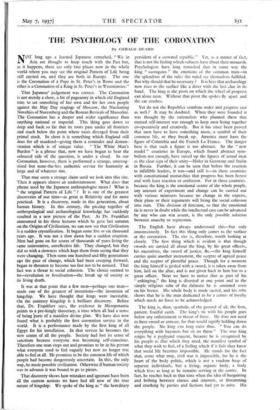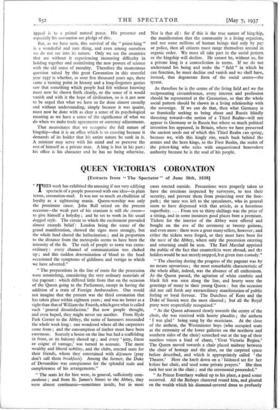THE PSYCHOLOGY OF THE CORONATION
By GERALD 'BEARD
NOT long ago a learned Japanese remarked, "We in Asia are thought to keep touch with the Past but, as it happens, there are only two places now in the whole world where you may see the original Pattern of Life being still carried on, and they are both in Europe. The one is the Coronation of a Pope in St. Peter's in Rome and the other is a Coronation of a King in St. Peter's in Westminster."
That Japanese' judgement was correct. The Coronation is not merely a show, a bit of pageantry in which old England tries to set something of her own and for her own people against the May Day stagings of Moscow, the Nucleating Novelties of Nuremberg and the Roman Revivals of Mussolini. The Coronation has a deeper and wider significance than anything national or imperial. This thing goes down so deep and back so far that its roots pass under all frontiers and reach below the point where races diverged from their primal stock. In short it is something which England still does for all mankind—giving them a reminder and demon- stration which is of unique value. " The White Man's Burden" is a phrase that, now we have begun to hear the coloured side of the question, is under a cloud. In our Coronation, however, there is performed a strange, unrecog- nised but none-the-less authentic service for humanity at large and of whatever tint.
That may seem a strange claim until we look into this rite. Then it appears almost an understatement. What does that phrase used by the Japanese anthropologist mean ? What is "the original Pattern of Life " ? It is one of the greatest discoveries of our time—as great as Relativity and far more practical. It is a discovery, made in this generation, about human history: In this century, the piecing together of anthropological and archaeological knowledge has suddenly resulted in a new picture of the Past. As Dr. Frankfurt announced in his three lectures which he gave last autumn on the Origins of Civilisation, we can now see that Civilisation is a sudden crystallisation. It began some five or six thousand years ago. It was not a slow dawn but a sudden eruption. Men had gone on for scores of thousands of years living the same uninventive, unreflective life. They changed, but they did so with a slowness which kept them from seeing that they were changing. Then some one hundred and fifty generations ago the pace of change, which had been creeping forward, began to threaten to become too fast not to be noticed. That fact was a threat to social cohesion. The choice seemed to be—revolution or fossilisation—the break up of society or its living death.
It was at that point that a few men—perhaps one man- made one of the greatest of inventions—the invention of kingship. We have thought that kings were inevitable. On the contrary kingship is a brilliant discovery. Before that, Dr. Frankfurt says, the evidence in Mesopotamia points to a pre-kingly theocracy, a time when all had a sense of being Inns of a manifest divine plan. We have also now found what is probably the first coronation service in the world. It is a performance made by the first king of all Egypt for his installation. In that service he becomes the new centre of all the people. Society had lost its sense of sanctions because everyone was becoming self-conscious. Therefore one man steps out and promises to be in his person what everyone used to feel vaguely but now no longer was able to feel at all. He promises to be the common life of which people had become dangerously uncertain. In this, the only way, he made possible civilisation. Otherwise if human society was to advance it was bound to go to pieces.
• That discovery shows how mistaken and ignorant have been all the current notions we have had till now of the true nature of kingship. We spoke of the king as "the hereditary president of a crowned republic." Yet, as a matter of fact, that is not the feeling which subjects have about their monarch. Psychologists have long remarked that in some way the king " surrogates " the emotions of the common man—in the splendour of the rule: the ruled see themselves fulfilled. But why should that be necessary ? It is here that archaeology now rises to the surface like a diver with the lost due in its hand. The king is the pivot on which the wheel of progress can alone turn. Without that pivot the spokes fly apart and the car crashes.
Yet do not the Republics combine order and progress just as well ? It may be doubted. When they were founded it was thought by the rationalists who planned them that mutual self-interest was enough to keep men living together co-operatively and creatively. But it has since been proved that men have to have something more, a symbol of their common life, or they break up. America must have the figure of Columbia and the French La France. The danger here is that such a figure is too abstract. So the "new model" countries in Europe, which found abstract sym- bolism not enough, have raised up the figures of actual men as the clear sign of their unity—Hitler in Germany and Stalin in Russia. Further, it can be seen that before the reaction to infallible leaders, it was—and still is—in those countries with constitutional monarchies that progress has been fastest and with least reaction or confusion. For in those countries, because the king is the emotional centre of the whole people, any amount of experiment and change can be carried out with various ministers because no change in the experts, their plans or their arguments will bring the social cohesion into ruin. This division of function, so that the emotional tie is never in doubt while the intellectual case can be advanced by any who can win assent, is the only possible solution between anarchy or repression.
The English have always understood this—but only unconsciously. In fact this thing only comes to the surface at the coronation. The rite is, therefore, worth looking at closely. The first thing which is evident is that though swords are carried all about the king, by his great officers, his executives, the sword of justice, &c.—the king himself carries quite another instrument, the sceptre of agreed peace and the sceptre of plentiful peace. Though for a moment the king himself is girded with a sword, it is taken away from him, laid on the altar, and is not given back to him but to a great officer. Next we have to notice that as part of his " enkinging," the king is divested at one point and in the simple religious robe of the dalmatic he is anointed even on his breast. His whole body is made sacred, and his robe shows that he is the man dedicated to be a centre of loyalty which needs no force to be acknowledged.
The king is, then, symbolic of the ground of all, the firm, patient, fruitful earth. The king's tie with his people goes below any enforcement or threat of force. He does not need to have sword or armour, for that would signify holding down the people. No king can long exist thus. "You can do everything with bayonets but sit on them." The true king reigns by a profound consent, because he is recognised by his people as that which they need, the manifest symbol of what they wish to feel, of a feeling which if it fails they know that social -life becomes impossible. He stands for the fact that, come what may, civil war is impossible, for he is the heart of the body politic, which is not a random heap of separate individuals, but a living, organic body, a body which lives as long as he remains serving at the centre. In fact, he reaches back to that time when the idea of bargaining and bribing between classes and interests, or threatening and crushing by parties and factions had yet to arise. His appeal is to a primal natural peace. His presence and especially his coronation are pledge of this.
But, as we have seen, this survival of the " priest-king " is a wonderful and rare thing, and even among ourselves we do not see into its nature. Only we see the countries that are without it experiencing increasing difficulty in holding together and assimilating the new powers of science with the old sense of morality. Therefore the momentous question raised by this great Coronation in this stressful year 1937 is whether, as over five thousand years ago, there came a turning point in history and a long-forgotten genius saw that something which people had felt without knowing must now be shown forth clearly, or the sense of it would vanish and with it the hope of civilisation, so is it not now to be urged that what we have so far done almost casually and without understanding, simply because it was quaint, must now be done with as clear a sense of its psychological meaning as we have a sense of the significance of what we do when we make trade agreements or currency adjustments.
That necessitates that we recognise the full nature of kingship—that it is an office which is so exacting because it demands of its holder that his entire nature be sunk in it. A minister may serve with his mind and so preserve the rest of himself as a private man. A king is lost in his part: his office is his character and he has no being otherwise. Nor is that all : for if this is the true nature of kingship, the manifestation that the community is a living organism, and not some millions of human beings tied only by pay or police, then all citizens must range themselves around in organic order. We must all take part in the social pattern or the kingship will decline. He cannot be, without us; for a private king is a contradiction in terms. If we do not understand his being and make the " field " in which he can function, he must decline and vanish and we shall have, instead, that degenerate form of the social centre—the tyrant.
As therefore he is the centre of the living field and we the reciprocating circumference, every interest and profession should be represented at the Coronation, so that the whole social pattern should be shown in a living relationship with the sovereign. If we can do that, then what Germany is so frantically seeking to bring about and Russia blindly thrusting toward—the notion of a Third Realm—will not appear in Germany or in Russia but where so much political invention has appeared, in Britain, where we have preserved the ancient seeds out of which this Third Realm can spring, because we, with this kingly rite, reach back behind the armies and the hero kings, to the First Realm, the realm of the priest-king who rules with unquestioned benevolent authority because he is the soul of his people.















































 Previous page
Previous page